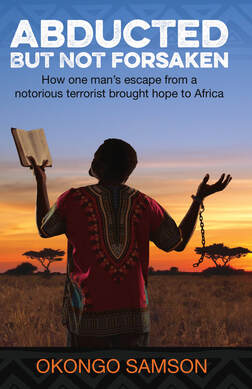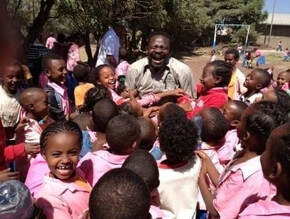Is it possible to forgive terrorists who kidnap and torture you?
Unite 4 Africa’s founder, Okongo Samson, says it is possible, and chronicles his harrowing story in new autobiography

For Immediate Release (Tucson, AZ) — According to John Hopkins Medicine, studies have found that the act of forgiveness can reap huge rewards for your health, lowering the risk of heart attack; improving cholesterol levels and sleep; and reducing pain, blood pressure, and levels of anxiety, depression and stress. In spite of the health benefits, 62% of American adults say they need more forgiveness in their personal lives (Fetzer Institute). Okongo Samson understands how difficult the act of forgiving can be. In his new autobiography, “Abducted But Not Forsaken: How One Man’s Escape from a Notorious Terrorist brought Hope to Africa,” Samson relives in detail his many escapes from kidnapping, imprisonment, and torture, and his struggle to forgive his abusers.
At 16 years old, Samson joined a missionary trip taking place near his home in Kenya. His bus trip was cut short as a radical group of terrorists kidnapped everyone on board. What happened next was weeks of what Samson describes as torture, sexual abuse, and unimaginable horror.
Realizing he was going to either die there or while trying to escape, Samson chose the latter, and waited for his opportunity for several days. He readied himself to be shot in the back and headed toward an open gate. He kept walking. Miraculously, he walked out of that camp. No one pursued him. No animal attacked him in the dense forest. He kept walking until he found someone to help him. He was free. That’s when the anger kicked in.
“I was angry with God,” says Samson. “I didn’t understand why He had allowed such evil to happen to me or to others. I prayed daily that my abductors would die, but they just continued to do unspeakable things. I was free, but I was hopeless. I was confused and bewildered as to why this had happened.”
As Samson began to reluctantly tell his story to others, he realized his escape was indeed a miracle. Still feeling a strong ministry call on his life, he kept sharing the Gospel with anyone who would listen, even though he still struggled with emotional and physical scars. He began speaking to larger groups while doors opened in other countries for him to minister. He was imprisoned in Yemen for sharing the Gospel, then he was thrown into a Saudi Arabian prison. It was there where Samson experienced life-altering torture. One night as he was being beaten, he heard the sound of a power drill and then felt it cutting through both his legs. An iron bar was placed in the holes and he was hoisted to the ceiling like a slab of meat.
At 16 years old, Samson joined a missionary trip taking place near his home in Kenya. His bus trip was cut short as a radical group of terrorists kidnapped everyone on board. What happened next was weeks of what Samson describes as torture, sexual abuse, and unimaginable horror.
Realizing he was going to either die there or while trying to escape, Samson chose the latter, and waited for his opportunity for several days. He readied himself to be shot in the back and headed toward an open gate. He kept walking. Miraculously, he walked out of that camp. No one pursued him. No animal attacked him in the dense forest. He kept walking until he found someone to help him. He was free. That’s when the anger kicked in.
“I was angry with God,” says Samson. “I didn’t understand why He had allowed such evil to happen to me or to others. I prayed daily that my abductors would die, but they just continued to do unspeakable things. I was free, but I was hopeless. I was confused and bewildered as to why this had happened.”
As Samson began to reluctantly tell his story to others, he realized his escape was indeed a miracle. Still feeling a strong ministry call on his life, he kept sharing the Gospel with anyone who would listen, even though he still struggled with emotional and physical scars. He began speaking to larger groups while doors opened in other countries for him to minister. He was imprisoned in Yemen for sharing the Gospel, then he was thrown into a Saudi Arabian prison. It was there where Samson experienced life-altering torture. One night as he was being beaten, he heard the sound of a power drill and then felt it cutting through both his legs. An iron bar was placed in the holes and he was hoisted to the ceiling like a slab of meat.

Throughout his journey, Samson has been imprisoned in 15 countries for sharing the Gospel. His physical body was often at the point of death, and he still grappled with anger and despair, but he poured over the scriptures to find solace and comfort. He was especially moved by the Apostle Paul’s ability to give thanks in all circumstances, even in the midst of his own imprisonments. Samson began to realize his healing would come through one thing — forgiveness.
“I came to understand that by holding on to unforgiveness to those who had abused and wronged me, I was disobeying God,” says Samson. “Engulfing myself in scripture, I began to become tenderhearted toward those who had hurt me. In my flesh, I wanted to hit back and stay angry, but Micah 7 showed me that God showed love toward a rebellious people. He had every right to repay them with wrath, but instead He extended forgiveness and grace. God expected me to do the same to those who had abused me. The path for my healing was paved with forgiveness.”
Samson traveled back to many of the places where he had been imprisoned and abused and extended forgiveness to his captors in person. In one Muslim country, the police officers were moved to tears by Samson’s words, even asking Samson to forgive what they had done to him.
Today, Samson’s ministry has grown into the international organization known as Unite 4 Africa, which has impacted people in 87 nations by providing sustainable solutions to communities, families, and individuals. His friendships with Muslims, many of whom have become Christ followers, has spawned underground churches in several Muslim-controlled countries. From discipleship training to feeding and educating orphans to offering clean water projects, Unite 4 Africa has become a lifeline for the poorest of the poor in many countries.
Samson now sees his suffering in a different light.
“When we overcome suffering, we gain a better understanding of what it means to be humble, courageous, and loving,” says Samson. “As you forgive, you also become its beneficiary. Forgiveness decreased my depression, anxiety, unhealthy anger, and symptoms of PTSD. Forgiveness led to my emotional, spiritual, and psychological healing. Forgiveness puts the final seal on what happened to hurt you. You will still remember what happened, but you will no longer be enslaved by it.”
About the author:
Okongo Samson is the author of the new book "Abducted But Not Forsaken." He is the Founder and the president of Unite 4 Africa. He went to Medical College in Nairobi and studied Medical Research and Oncology at Queen’s University in Northern Ireland. He gained a degree in Human Resource Management and later studied theology at Union Theological College, which lead him to join World Medical Mission. He has traveled to over 50 countries training ministries and helping develop church leadership. With his experience working in war torn places, the United Nations, Africa Union, and leaders from different countries have invited him to participate in peace reconciliation and negotiations in the Middle East and Africa. For more information visit www.Unite4Africa.org.
###
“I came to understand that by holding on to unforgiveness to those who had abused and wronged me, I was disobeying God,” says Samson. “Engulfing myself in scripture, I began to become tenderhearted toward those who had hurt me. In my flesh, I wanted to hit back and stay angry, but Micah 7 showed me that God showed love toward a rebellious people. He had every right to repay them with wrath, but instead He extended forgiveness and grace. God expected me to do the same to those who had abused me. The path for my healing was paved with forgiveness.”
Samson traveled back to many of the places where he had been imprisoned and abused and extended forgiveness to his captors in person. In one Muslim country, the police officers were moved to tears by Samson’s words, even asking Samson to forgive what they had done to him.
Today, Samson’s ministry has grown into the international organization known as Unite 4 Africa, which has impacted people in 87 nations by providing sustainable solutions to communities, families, and individuals. His friendships with Muslims, many of whom have become Christ followers, has spawned underground churches in several Muslim-controlled countries. From discipleship training to feeding and educating orphans to offering clean water projects, Unite 4 Africa has become a lifeline for the poorest of the poor in many countries.
Samson now sees his suffering in a different light.
“When we overcome suffering, we gain a better understanding of what it means to be humble, courageous, and loving,” says Samson. “As you forgive, you also become its beneficiary. Forgiveness decreased my depression, anxiety, unhealthy anger, and symptoms of PTSD. Forgiveness led to my emotional, spiritual, and psychological healing. Forgiveness puts the final seal on what happened to hurt you. You will still remember what happened, but you will no longer be enslaved by it.”
About the author:
Okongo Samson is the author of the new book "Abducted But Not Forsaken." He is the Founder and the president of Unite 4 Africa. He went to Medical College in Nairobi and studied Medical Research and Oncology at Queen’s University in Northern Ireland. He gained a degree in Human Resource Management and later studied theology at Union Theological College, which lead him to join World Medical Mission. He has traveled to over 50 countries training ministries and helping develop church leadership. With his experience working in war torn places, the United Nations, Africa Union, and leaders from different countries have invited him to participate in peace reconciliation and negotiations in the Middle East and Africa. For more information visit www.Unite4Africa.org.
###